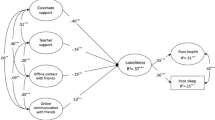Abstract
The present study aims to identify the predictive relationships between the exhibition in the social networks by classmates and teachers, and the life satisfaction in Peruvian adolescents. The sample was of 93 university students (65 men (69.9%) and 31 women (30.1%) between 16 to 19 years old (M = 17.09, S = .30), of the participants 62 (66.7%) were capital city, 16 (17.2%) were of province, and 3 (3.2%) students were of other country. One concludes that the analysis of multiple lineal regressions the cyber exhibited by classmates predicts positively the cyber exhibited by teachers (β = .53), and predicts positively the cyber exhibited by myself (β = −28). Then, cyber exhibited by teachers predicts positively the cyber exhibited by parents (β = .47). Finally, cyber exhibited by myself predicts positively the cyber exhibited by parents (β = .30), and predicts positively the life satisfaction (β = − .30).
Access this chapter
Tax calculation will be finalised at checkout
Purchases are for personal use only
Similar content being viewed by others
References
Jan, M., Anwwer, S., Ahmad, N.: Impact of social media on self-esteem. Eur. Sci. J. 13(23), 329–341 (2017). https://doi.org/10.19044/esj.2017.v13n23p329
McIntyre, M.: The evolution of social media from 1969 to 2013: a change in competition and a trend toward complementary, niche sites. J. Soc. Med. Soc. 3(2), 5–25 (2014)
Bouhnik, D., Deshen, M.: Whatsapp goes to school: mobile instante messaging between teacher and student. J. Inf. Technol. Educ.: Res. 3, 217–231 (2014). https://doi.org/10.28945/2051
Awada, G.: Effect of whatsapp on critique writing proficiency and perceptions toward learning. Cogent Educ. 3, 1–25 (2016). https://doi.org/10.1080/2331186x.2016.1264173
Iraola-Real, I., Moreyra-Cáceres, L., Cáceres-Buleje, V., Collantes-Jarata, A., Iraola-Real, E., Iraola-Real, M.: Cyber exposed: the social networks and the life satisfaction. In: III IEEE World Engineering Education Conference – EDUNINE (2019). https://doi.org/10.1109/edunine.2019.8875756
Shaw, L., Gant, L.: In defense of the internet: the relationship between internet comunication and depressionl loneliness, self-esteem an perceived social support. Cyber Psychol. Behav. 5(2), 157–172 (2002). https://doi.org/10.1089/109493102753770552
Barker, V.: Older adolescents’ motivations for social network site use: the influence of gender, group identity, and collective self-esteem. Cyber Psychol. Behav. 12(2), 209–213 (2009). https://doi.org/10.1089/cpb.2008.0228
Kraut, R., Patterson, M., Lundmark, V., Kiesler, S., Mukophadhyay, T., Scherlis, W.: Internet paradox: a social technology that reduces social involvement ando psychologicas well-being. Am. Psychol. 53(9), 1017–1031 (1998). https://doi.org/10.1037//0003-066x.53.9.1017
Moreno, M., Kolb, J.: Social networking sites and adolescent health. Pediatr. Clin. North Am. 59(3), 601–612 (2012). https://doi.org/10.1016/j.pcl.2012.03.023
Lewis, K., Kaufman, J., Christakis, N.: The taste for privacy: an analysis of college student privacy settings in an online social network. J. Comput.-Mediated Commun. 14(23), 79–100 (2008). https://doi.org/10.1111/j.1083-6101.2008.01432.x
Congreso de la República del Perú, Ley Nro 27337 - Código Civil del Niño y del Adolescente. https://www.mimp.gob.pe/files/direcciones/dga/nuevo-codigo-ninos-adolescentes.pdf
Light, B., McGrath, K.: Ethics and social networking sites: a disclosive analysis of facebook. Inf. Technol. People. 23(4), 290–311 (2010). https://doi.org/10.1108/09593841011087770
Siphamandla, L.: Cyberbullying a desecration of information ethics: perceptions of post-hihg school youth in a rural community. J. Inf. Commun. Ethics Soc. 14(4), 313–322 (2016). https://doi.org/10.1108/jices-04-2016-0009
Zou, X., Ingram, P., Higgins, E.T.: Social networks and life satisfaction: the interplay of network density and regulatory focus. Motiv. Emot. 39(5), 693–713 (2015). https://doi.org/10.1007/s11031-015-9490-1
Diener, E., Diener, M.: Cross-cultural correlates of life satisfaction and self-esteem. J. Pers. Soc. Psychol. 68(4), 653–663 (1995). https://doi.org/10.1037//0022-3514.68.4.653
Field, A.: Discovering Statistics Using SPSS, 3era edn. Sage Publications, Lóndres (2009)
Aiken, R.: Psychological Testing and Assessment, 11th edn. Allyn & Bacon, Boston (2002)
Cohen, J.: A power primer. Psychol. Bull. 112, 155–159 (1992). https://doi.org/10.1037/0033-2909.112.1.155
Bingham, N., Fry, J.: Regression: Linear models in statistics. Springer, New York (2010)
Burga-Cueva, J., Fernández-Meza, M., Llanca-Bravo, L., Tafur-Muñoz, D., Vera-Bances, P., Díaz-Vélez, C.: Nivel de satisfacción con la vida personal y riesgo de adicción a Facebook en estudiantes de instituciones educativas en una región del Perú. Revista Hispanoamericana De Ciencias De La Salud 1(2), 87–93 (2015). http://www.uhsalud.com/index.php/revhispano/article/view/55
Author information
Authors and Affiliations
Corresponding authors
Editor information
Editors and Affiliations
Rights and permissions
Copyright information
© 2020 Springer Nature Switzerland AG
About this paper
Cite this paper
Iraola-Real, I., Moreyra-Cáceres, L., Collantes-Jarata, L. (2020). Cyber Exposed at Preparatory: Classmates and Teachers Using Social Networks and Life Satisfaction. In: Agredo-Delgado, V., Ruiz, P.H., Villalba-Condori, K.O. (eds) Human-Computer Interaction. HCI-COLLAB 2020. Communications in Computer and Information Science, vol 1334. Springer, Cham. https://doi.org/10.1007/978-3-030-66919-5_11
Download citation
DOI: https://doi.org/10.1007/978-3-030-66919-5_11
Published:
Publisher Name: Springer, Cham
Print ISBN: 978-3-030-66918-8
Online ISBN: 978-3-030-66919-5
eBook Packages: Computer ScienceComputer Science (R0)




